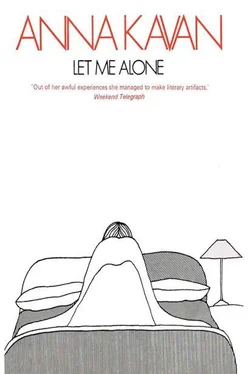WITHOUT doubt, Naunggyi was rather a nightmare to Anna. And like a nightmare it had its leit motif of horror — the marsh. It was the perpetual influence of the marsh itself which seemed to threaten her with unknown terrors.
By day it was not so obvious. It was veiled by the bright sunshine: hidden behind the strangeness, the unearthly beauty of the place. For it was beautiful. The marsh itself had beauty. The great, strange lake of swampy ground, mysterious with velvety patches of black ooze; the sinister, sudden gleams of iridescence, like glasses mirroring some magic sky; the succulent, emerald leaves, dangerous and poison-green; the piercing blueness of the small flowers. It had some half-evil glamour. But at night, when the darkness took it, it was a demon world.
At first she fought against it. She struggled with the influence of the place, to conquer it. But she was overcome. She felt as though she were being poisoned. Time passed imperceptibly.
There are certain shocks which, if sufficiently strong, seem to have power to destroy the balance of life. Such a shock would seem to overthrow all the intricate, vital, slowly developed mechanism of the mind, to plunge the victim into a chaotic half-world of confusion and loss. This was what had happened to Anna.
After Haddenham, after Blue Hills, Naunggyi came as the most violent shock to her. She was shocked, utterly, through and through, to the very roots of her being. And she was snatched away from everything that was familiar to her. The shock was too much for her. Really and truly, the shock was too violent. She was overcome.
Without realizing it, she was in a state bordering upon collapse. She was like a person who has been in a serious accident, and who walks away, apparently unharmed, but suffering a secret, intolerable strain which will later break out in some distorted sickness of the soul. She went about vague, silent, closed within herself. She was utterly bound up in herself; but in a bad way, a destructive way, as a plant becomes pot-bound. She could not get away from herself. She could scarcely bring herself to speak. It was as if she noticed nothing that went on. She wondered vaguely what was the matter. Her reflected face seemed blank and rather unnatural when she looked at it. But she felt nothing particular.
She was very isolated. The village of Naunggyi was a good mile away, across the yellow, turbulent river. Matthew’s bungalow was one of a collection of some half-dozen houses which formed the English colony, the seat of government. There was the newish, pretentious-looking club where every evening the English people assembled: the social centre. Round about were the other houses, not very near together. Each house stood in the midst of its own compound, a large rectangle of land, more or less wild, with the great forest trees still standing. Matthew’s house was the one nearest to the marsh. In the bazaar at Naunggyi one could buy food, and cheap household necessities, and the beautiful stiff silk from Mandalay, shot with every colour, like a handful of bright flowers. But there were no shops, no amenities of civilization at all.
But the place was beautiful: beautiful the pure, hot, dazzling days of the tropical winter; beautiful the huge trees, wreathed with their snaky ropes of knotted liana, and tree-orchids flowering in a starry, unexpected fashion. Beautiful, in the bright glitter before midday, to see the people, the natives in their gay clothes, stringing along the white road, on their way to the village. Beautiful to look out at sunrise over the marsh, and see, far off, the line of begging priests, unearthly in yellow robes, pass ghostlily on the distant skyline. Anna was content as far as the country itself went. She liked the strange people and the strange land. But her life, her life among the English people, she abominated.
The country itself was full of glamour. Sometimes she went out very early when the sun had just risen. And then silently she would walk in the deep dust, already beginning to grow warm as the sun strengthened. She would feel the soft warmth of the deep, powdery dust under her feet, and it was like treading on a living flesh that warmed and upheld her. And she would walk on entranced, while the violet shadows crept under the tall trees, and the sides of the branches burned golden, and in the sky, so dazzlingly bright, the fiery body of the sun reared fiercely, against the dark blue space. The magnificence of it, she felt it in her heart, the grand, upward surge of the sun, ruthless, proud, like the triumphant progress of some savage god, barbaric, gorgeous. She felt the splendour in her blood, like wine.
But the terror, the sinister suggestion of the marsh was a menace to her. It pervaded everything. It was a kind of emblem of all her dismay, a symbol of her fear and loneliness. Standing on the wooden veranda, and watching Matthew walking away to his office, walking past the palm tree, over the open space, her heart would contract, she would almost cry out with the sense of her isolation. And Matthew was so inhuman, it was so impossible to speak to him, he gave her no support at all. He even increased her loneliness. Sometimes she felt she must die.
Sometimes she would watch the natives, the handsome brown people, men and women, laughing and singing and talking, as they went by. They looked so happy, with a strange, insouciant happiness that was fascinating to her, a happiness which belonged to some other world. She wanted to talk to them, to get the secret of their happiness. But it was not allowed. A white woman must not speak to a native except to give an order. She was surrounded by a rigid system of commands and prohibitions. So and so and so only must she do. The mysterious threat to British prestige hung like a scarlet danger flag in front of any diversion. And a profound, angry disgust took hold of Anna, a sort of contemptuous despair. She began to despair. There was no hope for her. She had brought her life to an end, she had cut herself off from life.
All that was left was the little feminine social world of the club. What a world for Anna’s habitation! She felt as though she were living in some restricted era of the Victorian past. Everything was cramped and stilted and uncomfortable, hedged in with iron laws of custom and precedent, a complex system of etiquette. And the whole system seemed to be directed against the exercise of personal freedom — particularly against the freedom of the women. Between the sexes lay a vast, unbridgeable abyss, there was no spot of common ground where a man might meet a woman frankly, as one human being meets another. The thoroughness of this sequestration astonished her.
At the club men and women did not mingle. There was the ladies’ room where occasionally a man would come and talk for a little while, a visitor from some higher sphere. And here the ladies sat. Into the men’s rooms they were forbidden to penetrate. And at parties, when they assembled at each other’s houses, the same division tended to arise. Sooner or later, as though obeying some natural law, the men would drift together at one end of the room, leaving the women abandoned at the other.
And then the attitude of the men to the women, and the women to the men — it was false, oh, unspeakably false, artificial to a degree. The men seemed to fall into one of two classes of behaviour. Either they ignored the women entirely, passing them over as though unaware of their existence, boorish to the point of downright rudeness; or they were assiduously gallant, flirtatious. Boorish or flirty, so the male population of Naunggyi appeared to Anna. Never for one moment did any man treat any woman as a rational human being. They seemed to regard the women either as nuisances to be ignored as completely as possible, or as childish, brainless creatures to be flattered and flirted with and forgotten as soon as anything more important turned up.
Читать дальше












